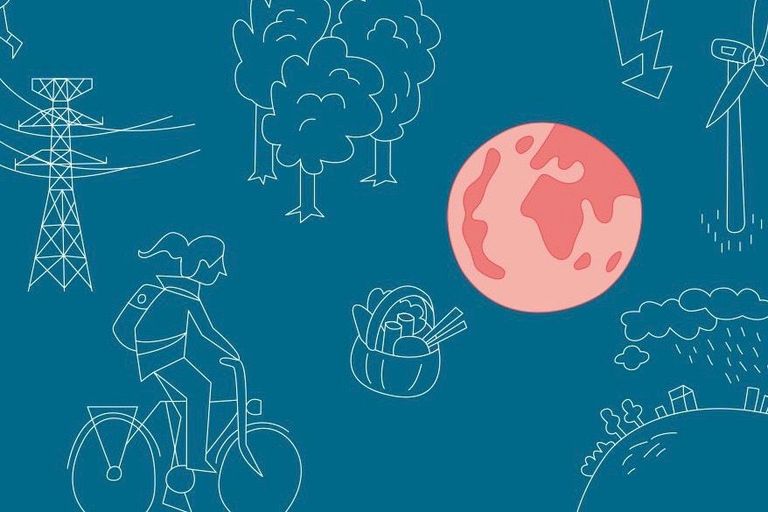24th Swiss Global Change Day – Meeting Report and Conference Documents
On 10 April 2024, the Swiss climate and global change science community met for the 24th time at the annual Swiss Global Change Day. About 180 participants attended the event and 60 posters were exhibited. Distinguished researchers presented scientific highlights and the programme provided enough time for discussions and networking.
Talks
Thomas Stocker from the University of Bern pointed out that although IPCC has decided not to commission more than one Special Report in its seventh assessment cycle, it is clear that the likelihood of surprises in the climate system – such as crossing of tipping points – increases with continuing warming. The science of such dynamics of the climate system is not mature to the extent that a broad scientific consensus would be available. Therefore, increased attention on this issue should be given high priority.
Valentina Bosetti from the Bocconi University in Milan stressed that we need to think more probabilistically about scenarios and weight them according to their probability of realisation. Decarbonisation transition involves finding the best realistic path between technically, economically, socially and institutionally feasible future scenarios. It is often underestimated to what extent the population is willing to protect the climate.
Sabine Fuss from the Mercator Research Institute on Global Commons and Climate Change and Humboldt University of Berlin addressed in her talk that CO2 removal (CDR) is necessary, but not sufficient to reach the Paris climate goals: Deep and rapid emissions reductions are key. There is more discussion now moving towards implementation and policy, but the focus on net-zero may neglect needs for CDR potential to draw down temperature.
Géraldine Pflieger from the University of Geneva offered an exchange of experiences on COP28 as a member of the Swiss delegation, representing science. COP28 was dedicated to the adoption of the closing decision of the first global review of the Paris Agreement. In addition to the debate on the pace of the phase-out of fossil fuels, the COP's decision provides an opportunity to assess the progress made in implementing all aspects of the Agreement and the next phases in defining the new commitments to be made by the States by 2024 to 2025.
Nicolas Senn from the University of Lausanne stressed that decarbonising healthcare systems is not enough, it is necessary to develop more resilient, less complex, alternative models of care. The current predominant healthcare economic model is incompatible with a sustainable vision of health, ecosystems, societies and health systems – but it offers a great opportunity to reframe healthcare systems and services while reducing their environmental impacts.
Robert Jnglin Wills from the ETH Zurich addressed in his talk that climate models show systematic biases in reproducing numerous recent trends. High resolution models may help, but we need simulations of more than 100 years per model. We need to continue grounding projections in physical understanding and developing statistical and machine learning methods to constrain the climate response from observations.
Diana Ürge-Vorsatz from the Central European University in Vienna and IPCC Vice Chair emphasised in her talk that every building built or retrofitted to less than a net zero level will lock us into a higher emission future. One of the tasks is to research further how the present substantial misdirected finance flows can be redirected to high efficiency and resilient building stocks.
Poster session
About 60 posters were presented at the event in the categories Atmosphere/Hydrosphere, Geosphere/Biosphere, Human Dimensions/Sustainability, and Organisations. The best posters in each field (Organisations excluded) were selected by a jury and honoured with a travel award of 1000 francs each.
The following posters were awarded:
Atmosphere/Hydrosphere
- Nicolas Hartmann (University of Bern): Characterizing heatwaves in the Northern Hemisphere
- Laure Moinat (University of Geneva): Investigating early warning signals using complex networks
Geosphere/Biosphere
- Luisa Minich (WSL & ETH Zurich): Short and long-term responses of soil CO2 effluxes under drought
Human Dimensions/Sustainability
- Lilian Goepp (University of Bern): Aedes-borne diseases risk modeling with regards to climate change in Switzerland
Downloads/Links
- 24th Swiss Global Change Day: Talk: Thomas Stocker
- 24th Swiss Global Change Day: Talk: Valentina Bosetti
- 24th Swiss Global Change Day: Talk: Sabine Fuss
- 24th Swiss Global Change Day: Talk: Géraldine Pflieger
- 24th Swiss Global Change Day: Talk: Nicolas Senn
- 24th Swiss Global Change Day: Talk: Robert Jnglin Wills
- 24th Swiss Global Change Day: Talk: Diana Ürge-Vorsatz
- 24th Swiss Global Change Day: Poster Award Winner: Nicolas Hartmann
- 24th Swiss Global Change Day: Poster Award Winner: Laure Moinat
- 24th Swiss Global Change Day: Poster Award Winner: Luisa Minich
- 24th Swiss Global Change Day: Poster Award Winner: Lilian Goepp
Kontakt
SCNAT
ProClim − Forum für Klima und globalen Wandel (ProClim)
Haus der Akademien
Postfach
3001 Bern



